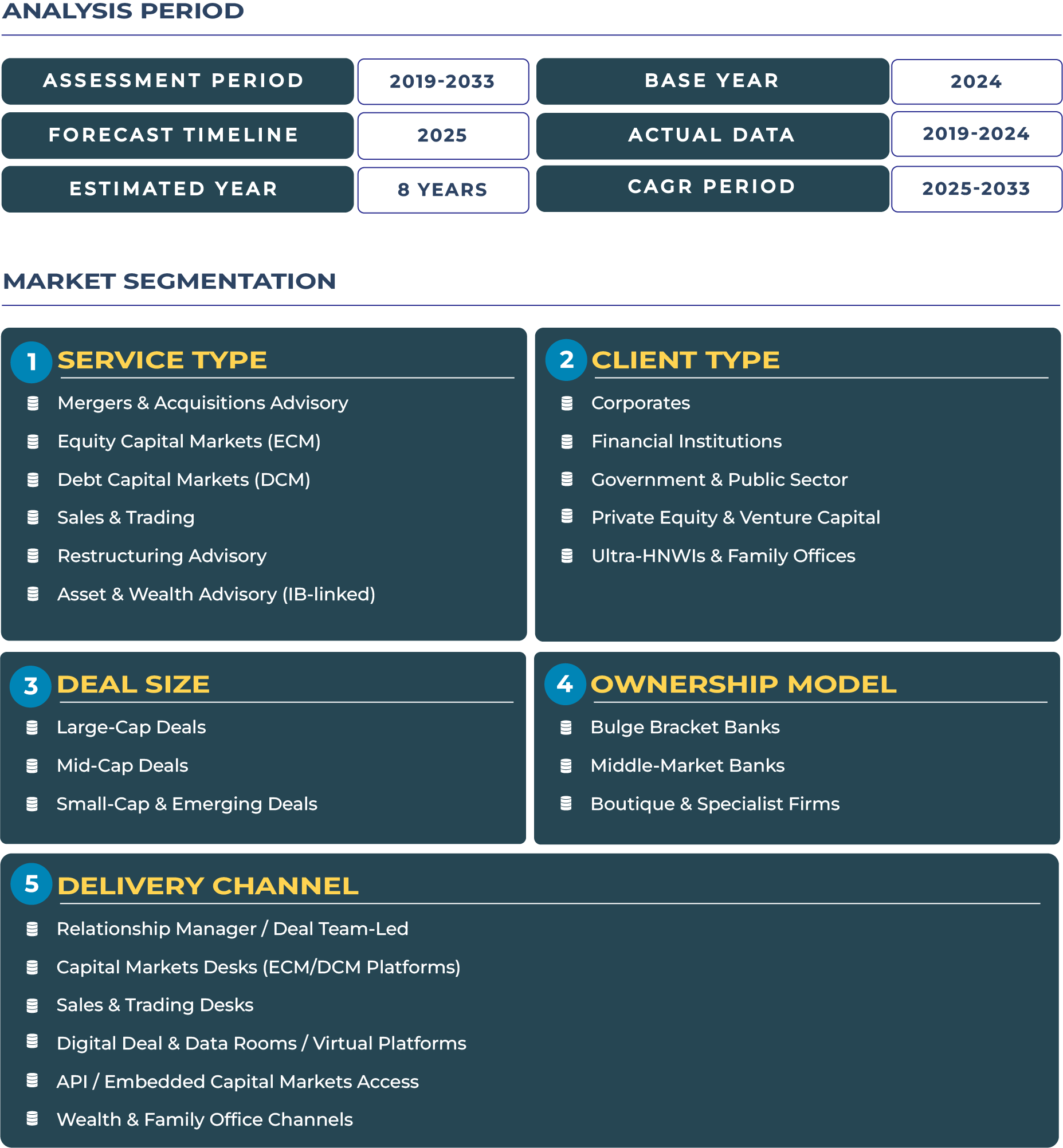Bahrain Investment Banking Market Outlook: Nurturing SME Advisory and Cross-Border Financial Growth
The Bahrain Investment Banking Market is evolving as a niche yet strategically significant sector within the Gulf region, driven by the country’s focus on fostering SME financing, digital innovation, and regional financial integration. With a small but sophisticated financial system supervised by the Central Bank of Bahrain (CBB), the nation continues to strengthen its role as a regional advisory hub for startups, private businesses, and cross-border investment deals. The market, valued at USD 66.4 million in 2025, is anticipated to maintain modest stability and reach USD 72.3 million by 2033, growing at a CAGR of 1.1%, according to DataCube Research. This trajectory reflects Bahrain’s careful balancing of regulatory modernization, fintech integration, and regional cooperation amid its limited domestic corporate base.
Note:* The market size refers to the total revenue generated by banks through various services.
Leveraging SME and Regional Advisory to Sustain Competitive Relevance
Bahrain investment banking industry continues to capitalize on its open financial environment and SME-oriented advisory strength. Positioned as one of the first Gulf economies to adopt open banking frameworks, Bahrain’s financial ecosystem facilitates a collaborative environment between traditional banks and fintech innovators. This has led to enhanced access to capital markets and advisory support for small and mid-sized enterprises (SMEs), a segment that forms the backbone of the nation’s private economy. Initiatives under Bahrain Economic Development Board have fostered business-friendly reforms and investor-focused policies, enabling the growth of SME-linked deal activity in mergers, equity placements, and restructuring services.
While the market’s growth appears moderate, with steady returns projected through 2033, the underlying resilience is driven by Bahrain’s strategic positioning as a regional financial hub. Proximity to major GCC financial centers, particularly Saudi Arabia and the UAE, enhances its capacity to attract cross-border transactions and advisory mandates. Furthermore, the increasing emphasis on fintech adoption and wealth advisory diversification continues to strengthen the investment banking landscape despite global market volatility and energy price fluctuations.
Drivers & Restraints: Understanding the Balance Between Regional Strength and Market Limitations
Regional FX and Wealth Management Hub Strengthens Investment Banking Competitiveness
The Bahraini investment banking sector benefits from its evolving role as a regional foreign exchange and wealth management hub. The country’s liberalized regulatory regime and deep connectivity with the GCC financial system enable advisory firms to structure regional bond issuances, debt refinancings, and equity market listings efficiently. The Central Bank of Bahrain’s efforts in fostering liquidity management tools and encouraging Islamic finance participation have further enhanced corporate financing activity. Moreover, as multinational firms and family offices expand their presence in Manama, the demand for tailored asset and wealth advisory services continues to rise, supporting the overall market’s stability and reputation for transparency.
Small Domestic Market Size Restrains Large-Scale Investment Banking Activity
Despite its strengths, Bahrain’s small economic scale poses a natural restraint on the investment banking industry. The domestic corporate landscape offers limited opportunities for large mergers and acquisitions or complex debt capital market transactions. Additionally, competition from larger neighboring markets such as Saudi Arabia and the UAE often diverts regional mandates away from Bahrain-based advisory firms. While government-driven projects and privatization initiatives create selective opportunities, the dependency on regional partnerships and limited domestic liquidity prevent the sector from achieving rapid expansion. Nevertheless, Bahrain’s ability to serve as a financial bridge for niche markets, particularly in SME advisory, helps offset these structural constraints to some extent.
Trends & Opportunities: Digital Transformation and SME-Centric Advisory Lead the Next Phase of Growth
Fintech-Enabled Advisory Transformation in Bahrain Investment Banking Ecosystem
A major trend shaping Bahrain investment banking landscape is the accelerating integration of fintech-driven advisory models. Platforms leveraging AI-enabled analytics, digital KYC, and virtual deal rooms are transforming how advisory services are delivered to clients. The rise of fintech-focused partnerships between local banks and international financial technology companies is creating new service efficiencies and transparency in equity capital markets (ECM) and debt capital markets (DCM). Moreover, Bahrain’s regulatory sandbox program under the CBB continues to attract innovative startups that complement traditional investment banks, promoting cross-border collaboration and expanding service offerings beyond the conventional deal-making framework.
SME and Cross-Border Advisory: Unlocking the Next Growth Opportunity
SME and cross-border advisory are emerging as the defining opportunities for Bahrain investment banking sector. As the government prioritizes private sector diversification under Vision 2030, SMEs are increasingly seeking structured financial advice for scaling operations, attracting foreign investors, and managing ownership transitions. Investment banks are tapping into this demand by launching specialized advisory desks focused on family-owned businesses and regional expansion deals. Cross-border collaborations with GCC and Asian banks also provide access to new financing routes, particularly for infrastructure and technology sectors. This evolution underlines Bahrain’s potential to position itself as an agile advisory center for small-scale but high-value regional deals.
Competitive Landscape: Strategic Realignments Amid Fintech and SME Growth
The Bahrain investment banking market is characterized by a balanced presence of local and international players that continue to adapt through innovation and partnerships. Key institutions such as Gulf Finance House, Arab Banking Corporation, and SICO Bahrain remain instrumental in driving corporate advisory and wealth management activities. These institutions have increasingly focused on SME lending platforms, private placements, and digital advisory integration. For example, SICO has advanced its digital investment platforms to align with Bahrain’s broader fintech vision, reinforcing its leadership in regional equity trading and asset management.
International players maintain strategic partnerships with Bahraini banks to strengthen their GCC footprint, emphasizing deal syndication, debt refinancing, and infrastructure-linked financing. The government’s sustained focus on fintech and regional cooperation creates a conducive environment for these firms to innovate, thereby contributing to the long-term sustainability of Bahrain investment banking ecosystem.







